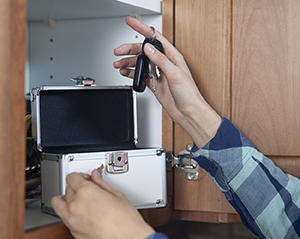For caregivers: Safety tips for people with dementia
The symptoms of dementia can sometimes lead to unsafe situations. Areas of special concern include driving and wandering away from home. You may also need to make changes in your loved one’s living space. Doing so can help protect your loved one even when you aren’t around.
 |
| Prevent driving by keeping your loved one’s car keys in a secure place. |
Discourage driving
Driving is often not safe for a person with dementia. It may even be illegal. Ask your loved one's healthcare provider if it’s safe for your loved one to drive. Some rehab centers can assess driving safety. Ask the provider if such an assessment is advised. If safety is in question, use these tips to prevent your loved one from getting behind the wheel:
-
Limit access to the car. Keep the keys with you or lock them away.
-
Ask an authority figure, such as a healthcare provider or insurance agent, to tell your loved one not to drive.
-
Ask your loved one's healthcare provider about contacting the Department of Motor Vehicles.
Watch for wandering
People with dementia may wander away from the house. They may get lost and confused about their location. They often have a reversed sleep-wake cycle. This means they can be up all night and wander away when you least expect it. To keep your loved one safer, try these tips:
-
Have your loved one wear an ID bracelet at all times. You can also enroll your loved one in the Alzheimer’s Association’s “Safe Return” program.
-
Install door chimes so you know when outside doors are being opened.
-
Ask neighbors to call you if they see your loved one out alone.
-
Go with your loved one if they insist on leaving the house. Don’t argue or yell. Instead, use distraction or gentle hints to get them to return home.
-
Look into web-based monitoring programs or GPS devices that keep track of your loved one's location.
-
If your loved one is no longer driving, be sure they have no access to car keys. They may forget they can no longer drive and wander after getting behind the wheel.
Make living spaces safe
Keep your loved one safe by simplifying their living space. This means reducing clutter and removing hazards. Put night lights and smoke detectors in every room, including the kitchen and bathroom. Keep the batteries fully charged. You may also want to get advice from an occupational therapist (home safety expert). Keep in mind that some changes may not be needed right away. Focus on major safety concerns first.
In living spaces
Suggested safety steps include:
-
Make sure carbon monoxide and smoke detectors are installed, and fire extinguishers are on hand. Have them inspected regularly.
-
Post the home address and emergency numbers for police, fire departments, hospitals, and poison control helplines near all phones.
-
Install an answering machine or voicemail, so important messages aren’t missed.
-
Reduce tripping hazards. Move electrical and phone cords out of the way. Place colored tape on the edges of steps.
-
Keep walkways and rooms well lit. Use night lights in hallways, bedrooms, and bathrooms.
-
Consider removing guns or other weapons from the home. Or store them in a locked cabinet.
In the bathroom
Suggested safety steps include:
-
Store hair dryers, razors, and curling irons in a secure area.
-
Remove poisons, such as drain cleaner and nail polish remover.
-
Keep medicines in a secure area, not in the medicine cabinet.
-
Remove inside door locks, so your loved one doesn’t get locked inside.
-
Install grab bars in the shower, tub, and toilet to prevent injury.
In the kitchen
Suggested safety steps include:
-
Unplug toasters and other appliances when not in use.
-
Limit access to alcohol. It can make symptoms much worse.
-
Remove or cover knobs on stoves and other appliances.
-
Check food for spoilage. Your loved one may not know when food has gone bad.
Other areas of the home
Suggested safety steps include:
-
Lock up hazardous substances, such as bleach, pesticides, and paint thinners.
-
Keep pool or hot tub areas securely closed off.
-
Set the hot water heater below 120°F (48.8°C).
-
Keep a spare key outside the house in case your loved one locks you out.
Prevent fraud
People with dementia may be easy victims for dishonest salespeople or money scams. Try placing a “No Solicitations” sign on your loved one’s front door. Limit access to credit cards and cash.
Can my loved one live alone?
Early on, people with dementia can often handle daily tasks with little or no help. But at some point, it won't be safe for them to be on their own. The timing for this is different for each person. But problems such as forgetting to eat, bathe, or take medicines, or having financial problems, can all be signs that more supervision is needed. If you have concerns, talk with your loved one’s healthcare provider.
Online Medical Reviewer:
Anne Fetterman RN BSN
Online Medical Reviewer:
Heather M Trevino BSN RNC
Online Medical Reviewer:
Rita Sather RN
Date Last Reviewed:
8/1/2024
© 2000-2024 The StayWell Company, LLC. All rights reserved. This information is not intended as a substitute for professional medical care. Always follow your healthcare professional's instructions.